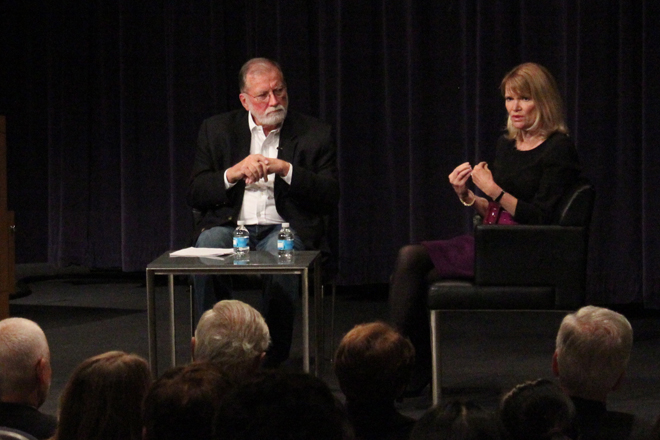
After dozens of trips overseas, years of covering the Pentagon, multiple Emmys and a Peabody award under her belt, Martha Raddatz has a few stories to tell.
Raddatz spoke to a full house in the McCormick Tribune Forum on Thursday. Raddatz, the ABC News Senior Foreign Affairs Correspondent, discussed her career with Timothy McNulty, lecturer and co-director of the National Security Journalism Initiative at the Medill School of Journalism, Media, Integrated Marketing Communications. A question-and-answer period followed the discussion.
In an interview with North by Northwestern before the event, Raddatz touched on many of the issues highlighted in the discussion. As a correspondent, she has covered the White House, the Pentagon and many war zones and conflicts abroad. According to her ABC News biography, she has traveled to Iraq 21 times to report on conflicts there. They were experiences she had after learning journalism “from the bottom up."
“I never took a journalism class, I didn’t major in journalism ... I’m a terrible example because I dropped out of college. Everything I learned about journalism, I learned on the job,” she said. “I think what I would tell journalism students today is to not just study journalism. They should minor in history or economics or political science because you have to know something about the world before you actually report on it.”
In both the interview and the discussion, Raddatz emphasized that journalism is more than just writing the facts.
“I think it’s really important – and I tell people at work this too – that you’re a storyteller; you’re not just a journalist,” Raddatz said in the discussion.
Although Raddatz said she is frustrated that Americans are not as interested in the war as they could be, she blames journalists as well, saying they must make articles interesting so people want to pay attention to "the vegetable journalism: the stuff people need to know but don't want to hear."
"I always joke, I'm the vegetable course," she said in the interview. "I think it's harder and harder. People can read what they want to read .... It's just that you have to discipline yourself to follow the news. It is a civic responsibility to know what is going on in this country."
This sentiment was reiterated later in the discussion.
“I know, particularly in times when the economy is bad, that Americans are thinking about America,” Raddatz said. “It’s natural. Sometimes when other journalists and me complain if we can’t get on [air] enough, I say ‘It’s our fault, too.’ You have to make people want to listen, to see or to read what you’re writing, and there are ways to do that.”
The drive for captivating storytelling has benefitted Raddatz in the field. In one story, instead of going along with the other journalists in Iran on a carrier, she chose to go on a U.S. destroyer. While those on the carrier did not get much usable material, Raddatz captured remarkable footage.
“They had a helicopter on the ship, and I was like ‘You know, if you’re taking the helicopter up, can I just go up and we can get a view of all the other ships?’ We got fantastic, just fantastic stuff,” Raddatz said in the discussion.
Medill freshman Danielle Levy said she found this to be Raddatz’s most compelling point. Levy came to the discussion after following Raddatz’s career for years.
“She’s someone whom I admire, and I’ve admired her for a long time,” Levy said.
Others were drawn based on the variety of jobs Raddatz has had in her career. Medill graduate student Shelby Livingston wanted to attend the discussion after watching Raddatz moderate the 2012 vice presidential debate.
“I remember watching the debate thinking, ‘She did a really great job,’” Livingston said.
Even after everything she’s done, however, Raddatz said it’s important to find happiness outside of a career. She ended the discussion by encouraging journalists to love the job but have outside interests as well.
“Be passionate about this,” she said. “I’m obviously so passionate about what I do, and I love it and it’s important to me, and my children and my husband understand it’s important to me, but you have to have a life.”